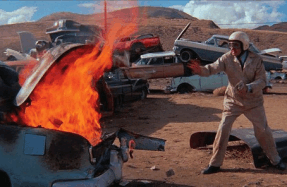A Pierce of the Action

In his Camera Lucida, Roland Barthes identified two elements at work in the act of viewing photographs. On one level was what he labelled the studium, which he defines as a sympathetic interest on the part of the viewer, “a kind of general, enthusiastic commitment, but without special acuity…To recognize the studium is inevitably to encounter the photographer’s intentions, to approve or disapprove of them, but always to understand them, for culture (from which the studium derives) is a contract between creators and consumers.” The second level of engagement he called the punctum, “that element which will break (or punctuate) the studium. This time it is not I who seek it out (as I invest the field of the studium with my sovereign consciousness), it is this element which rises from the scene, shoots out of it like an arrow, and pierces me.”
Barthes defined the punctum as an accident, an unpredicted and uncontrollable element within the photographic scene, which means that, strictly speaking, the term cannot be ported directly over into the realm of narrative cinema: theoretically, a filmmaker could rephotograph an image or a scene endlessly until they achieved their desired effect. But if intentionality belies the punctum’s inherently accidental nature, in its sensorial or emotional affect a scene in a narrative film can still yield that unexpected element that suddenly arrests us, and offers us a deeper access into the (hi)stories depicted.
I was reminded of Barthes’ concept of the while thinking of two films I saw over the course of the last year—two long-unavailable films about contemporary Black life, both directed by white men, and both of which are enjoying an ongoing rediscovery. Relocating Liam O’Flaherty’s venerable novel (and John Ford’s 1935 film) from Ireland in the aftermath of the 1920s Civil War to Cleveland’s Black militant underground in the days just after Martin Luther King’s assassination, (1968) was released on DVD and Blu-ray by Olive Films in 2012, subsequently screened in the Locarno Film Festival’s retrospective program in 2019, and enjoyed a streaming run on the Criterion Channel that same year. Criterion also had a hand in the new restoration of (1974), a remarkable comedy-drama about a Black working mother of six (Diahann Carroll) finding approaching-middle-age love with a charming sanitation worker (James
You’re reading a preview, subscribe to read more.
Start your free 30 days





